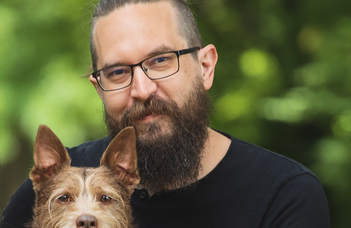Tamás Faragó wins the most prestigious European grant

"Vocal learning, in simple terms, is the ability to modify our vocalizations based on an external sound sample. Its most complex form is vocal imitation and the ability to produce sounds that are not part of the innate repertoire. What is basic in humans is rare in other mammals, and so far only cetaceans, seals, bats and elephants have been described as having vocal imitation abilities. Only a few simple elements of vocal learning have been observed in our closest primate relatives, so the evolutionary emergence of this ability in humans is still a mystery," says Tamás Faragó, research fellow at the Department of Ethology at ELTE.
To explore this, in the project, called K9VocLearn, the researchers will test dogs as a new model species, as they have been subjected to positive selection in the human environment during domestication and later by breed selection, such as increased social tolerance and tendency to cooperativity, which may have played a key role in the emergence of vocal learning in humans. We hypothesize that these effects may have also paved the way for the emergence of some subskills of vocal learning in dogs.

Tamás Faragó and his dog Joel
“Over the next five years, we will be studying, among other things, the vocal repertoire of dogs and the development of individual vocalizations. We will also investigate their vocal learning abilities, with a special focus on differences between breeds and breed groups. The aim is to explore how and to what extent this is related to cooperative abilities, genetic distance from a wolf ancestor, and the occurrence of so-called domestication syndrome traits such as shorter, more rounded heads, spotting, drooping ears, and stubby tails. The results will help us to learn more about the importance of selection effects and the evolution of vocal learning abilities, i.e. the emergence of the abilities necessary for the development of human speech," says Tamás Faragó , summarising the plans for the next five years.
The project will start at the Department of Ethology at ELTE, headed by Ádám Miklósi, where before Tamás Faragó, Enikő Kubinyi and Attila Andics, have also won ERC grants in the last 6 years, which is quite a unique achievement in this field.
For more than twenty years, researchers in the Department of Ethology have been studying the cognitive abilities of the family dog, especially in its interactions with humans. Tamás Faragó has been working on vocal communication in dogs since 2006.
 Tamás Faragó and his dog Joel
Tamás Faragó and his dog Joel
"Measuring the vocal learning abilities of dogs is an under-studied area, and we need to develop the scientific methodology. In addition to behavioural tests, non-invasive electroencephalography (EEG) and functional magnetic resonance imaging (fMRI), as well as behavioural genetics methods, which have been successfully used in the department, will be important elements of our studies. We also use a technique called high-density diffusion optical tomography (HD-DOT), a newer brain imaging method using infrared light. The application of this technique on dogs is currently under development in the department. In addition to this, we would like to use the potential of Citizen Science to involve in data collection a wide range of owners, both nationally and internationally. We will further strengthen the bioacoustics research in the department and expand our capabilities by incorporating new machine learning methods," concludes Tamás Faragó.
Photos: Oszkár Dániel Gáti

